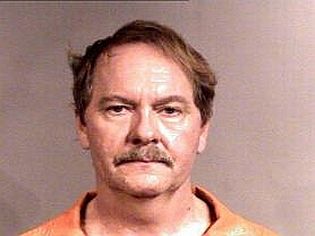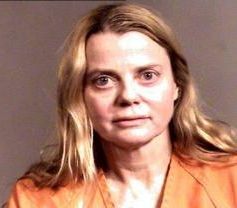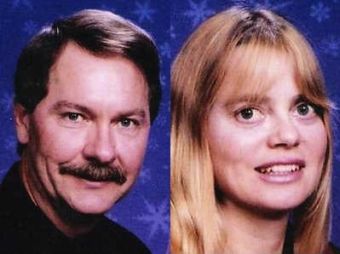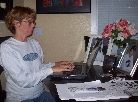
Publisher:
Bonnie King
CONTACT:
Newsroom@Salem-news.com
Advertising:
Adsales@Salem-news.com

~Truth~
~Justice~
~Peace~
TJP
May-29-2010 21:15

 TweetFollow @OregonNews
TweetFollow @OregonNews
Schneider Trial - Week 5
Marianne Skolek Salem-News.com"It is very sad, very sad for anybody to lose their life," Dr. Stephen Schneider on the stand
 On trial, Dr. Stephen Schneider claims his clinic was busy because it was one of few that took Medicaid patients. But Assistant U.S. Attorney Tanya Treadway noted on Thursday that 320 other area doctors also accepted Medicaid. Courtesy: KECH Eyewitness News 12 HD |
(WICHITA, Kansas) - Assistant U.S. Attorney Tanya Treadway cross examining Dr. Stephen Schneider on the stand about a deceased patient named "Robin"
Schneider: "It says right here, increased function and quality of life -- She had a life because of her pain management."
Treadway: "She doesn't anymore, does she?"
Schneider: "No, she doesn't."
 Marianne Skolek |
Dr. Schneider was on the stand this week and the testimony was quite intriguing.
Schneider's attorney, Lawrence Williamson had him "play doctor" by demonstrating to the jury his examination of a "patient" to convince the jury that it wasn't a revolving door of patients coming in and out for treatment.
Williamson played the part of a "patient" complaining of shoulder pain while Schneider - with a stethoscope around his neck - demonstrated a typical patient exam and the progress notes he would write up.
Schneider checked heart and lungs, peered into Williamson's ears, checked range of motion and took down medical history and complaints. "Playing doctor" took 10 minutes and 18 seconds. The government alleges a thorough physical examination could not be conducted by Schneider in the 10 minutes scheduled between patients -- previous testimony indicated that nationwide an average doctor visit takes 7 minutes.
Dr. Doug Jorgensen, a Massachusetts pain management specialist, testified that the number of patients was "beyond excessive," at the Schneider clinic and the sheer volume would make it difficult to monitor patients. He also said prescription refills were given to patients whose urinary screening tests showed they were not taking their pills -- a sign the drugs were being sold.

Jorgensen was paid more than $21,000 to review 54 records for prosecutors. In testimony, Jorgensen told jurors the Schneider Medical Clinic was not a "legitimate medical practice." "It doesn't even begin to approach our expectation and responsibility to be able to provide health care in our communities and our country," he said.
Jorgensen, also a professional certified billing expert, testified he thought 93 percent of the insurance claims filed at the Schneider Clinic for office visits were fraudulent because they showed a higher level of care than was actually provided. Some claims also indicated Schneider himself had seen patients when they were actually seen by a physician's assistant. In one particular day, bills indicated that Schneider treated 117 patients.
Defense attorney Lawrence Williamson pointed out several fee tickets that were correctly marked by the providers who saw the patients, indicating mistakes were made without the doctor's knowledge when the paperwork reached the clinic's billing department. He said that showed there was no criminal intent to defraud.
Jorgensen insisted that the number of claims incorrectly billed was still far higher than the typical error rate. He said the billing patterns showed "intentional deceit."
On cross examination, Jorgensen acknowledged he only reviewed 54 medical records, autopsies and toxicology reports that prosecutors had picked for him and they covered only a few of the 10,000 patients seen at the clinic.
In one dramatic moment in the courtroom, Dr. Jorgensen in tears testified -- "The deaths were not only preventable in my opinion, but wouldn't have happened if interventions had been made."
Assistant U.S. Attorney Treadway displayed the chart of one man who visited the clinic twice in five days and received 120 Percocet tablets each time. Schneider previously had testified in a deposition of a civil lawsuit that the man was given the second prescription because "his chart was unavailable."
A former physician assistant remembered telling Stephen Schneider one of their patients had overdosed on prescription drugs and died. "Oh, well," Debra Klingsick remembered the doctor replying.
Klingsick said she worked as a physician assistant at the Schneider Medical Clinic for four months in 2004. She said she often worked weekend shifts without supervision by the doctor and was given prescription slips that Schneider had previously signed.
Another former employee, Hein Nguyen Tran testified she had a similar experience at the clinic in 2005.
Both Klingsick and Tran said Linda Schneider, a nurse who ran the office, hired them as physician assistants the day they applied -- and did not check their references. Tran was fresh out of school, and neither said they were trained in pain management, and they didn't receive training at the clinic. In any event, they were encouraged to write prescriptions for narcotics -- strong ones.
Both said they rarely spent more than five minutes with a patient and refilled prescriptions following Stephen Schneider's orders. Tran said Schneider himself spent little more time with patients than it took to write a refill. Tran testified "It was usually a meet-and-greet, 'Hi, how are you doing -- here's your script." She witnessed this while shadowing Schneider in the clinic.
Klingsick told jurors that she believed Schneider was a "legalized drug dealer."

Linda Schneider would pace the halls and knock on the door of the exam room if she thought an exam was taking too much time, Tran said.
Both former physician assistants testified that Linda Schneider wanted prescriptions refilled in person, rather than over the phone, so the clinic could charge insurance companies for office visits.
Tran said patients would become hostile when she said she couldn't refill their prescriptions. One patient threw a soda can at her.
Klingsick and Tran said they would "fire" patients they thought were addicts seeking drugs, removing them from being able to receive the narcotics. The patients would end up back on the clinic's prescription rolls. At least one was taken back in the very next day, Tran said.
One of those patients testified she was such a drug seeker. As with other patients at trial, she was not identified by her full name to protect her medical privacy.
The woman testified she went to the clinic looking for painkillers after another doctor stopped giving them to her. She began taking them for a back injury after a car accident.
The woman said she often waited two to three hours to be seen -- and was given a prescription for her drug of choice, Lortab.
She told the jury she noticed most of the others in the waiting room were sweating and shaking. Those were the symptoms she often took to the clinic — because she was sick from not taking the drugs her body craved.
"When you're a pain pill addict, you can spot the others," she said.
 The Schneiders in happier times |
A former patient, identified as Alicia C., testified that she was addicted to painkillers and was not in pain when she went to Schneider for painkillers. She said she lied about her pain and was given a prescription after a 10-minute office visit. "It was like Burger King for a pain addict," she said. "You got what you ordered."
She acknowledged that the clinic changed her medications to help wean her off painkillers after she asked for help kicking her addiction. After an emergency room visit for an overdose, the clinic entirely cut off her prescriptions for controlled substances, she testified.
Tom Wagner, a sales representative for Purdue Pharma, testified that records of his sales calls to the clinic showed Schneider was initially reluctant to switch his patients to OxyContin but later reported seeing better pain control in patients who used the drug.
He acknowledged that Purdue Pharma, the maker of the popular painkiller, had pleaded guilty to misleading physicians about OxyContin's addictiveness and agreed to pay more than $600 million in fines.
Schneider claims his clinic was busy because it was one of few that took Medicaid patients. But Assistant U.S. Attorney Tanya Treadway noted on Thursday that 320 other area doctors also accepted Medicaid.
"I always felt the Medicaid people were some of the sickest," Schneider testified. "I always thought if I could help them get better, they could get real insurance." Unfortunately, Schneider never took Medicaid 101 -- "getting better" has absolutely nothing to do with obtaining "real insurance" -- if a patient qualified for Medicaid, it was an economic issue -- not a medical issue.
"It is very sad, very sad for anybody to lose their life," Schneider said on the stand. "I really feel if I had any opportunity I could have saved their life, and missed it, I regret that. I would never have written them another prescription if I thought it was going to hurt them."
This article written as a voice for Robin G, age 45 died May 15, 2007 whose family regrets she was never given the opportunity to have her life saved.
The Series:
Jun-16-2010: Schneiders Fate in the Hands of the Jury - Marianne Skolek Salem-News.com
Jun-11-2010: Schneider Trial Week 7 - Marianne Skolek Salem-News.com
Jun-09-2010: Tumbling Tumbleweeds - a Continuing Look at the Schneider Trial in Kansas - Marianne Skolek Salem-News.com
May-29-2010: Schneider Trial - Week 5 - Marianne Skolek Salem-News.com
May-23-2010: Schneider Trial - Week 4 - Marianne Skolek Salem-News.com
May-16-2010: Week 3 - Stephen Schneider Trial - Marianne Skolek Salem-News.com
May-13-2010: American Pain Society's 29th Annual Scientific Meeting - Marianne Skolek Salem-News.com
May-08-2010: Week 2 of the Schneider Trial - Marianne Skolek Salem-News.com
May-02-2010: Week 1 of Pill Mill Doc Trial in Wichita, Kansas - Marianne Skolek Salem-News.com
===========================================
 Salem-News.com Reporter Marianne Skolek, is an Activist for Victims of OxyContin throughout the United States and Canada. In July 2007, she testified against Purdue Pharma in Federal Court in Virginia at the sentencing of their three CEO's who pled guilty to charges of marketing OxyContin as less likely to be addictive or abused to physicians and patients. She also testified against Purdue Pharma at a Judiciary Hearing of the U.S. Senate in July 2007. Marianne works with government agencies and private attorneys in having a voice for her daughter Jill, who died in 2002 after being prescribed OxyContin, as well as the voice for scores of victims of OxyContin. She has been involved in her work for the past 7-1/2 years and is currently working on a book that exposes Purdue Pharma for their continued criminal marketing of OxyContin.
Salem-News.com Reporter Marianne Skolek, is an Activist for Victims of OxyContin throughout the United States and Canada. In July 2007, she testified against Purdue Pharma in Federal Court in Virginia at the sentencing of their three CEO's who pled guilty to charges of marketing OxyContin as less likely to be addictive or abused to physicians and patients. She also testified against Purdue Pharma at a Judiciary Hearing of the U.S. Senate in July 2007. Marianne works with government agencies and private attorneys in having a voice for her daughter Jill, who died in 2002 after being prescribed OxyContin, as well as the voice for scores of victims of OxyContin. She has been involved in her work for the past 7-1/2 years and is currently working on a book that exposes Purdue Pharma for their continued criminal marketing of OxyContin.
Marianne is a nurse having graduated in 1991 as president of her graduating class. She also has a Paralegal certification. Marianne served on a Community Service Board for the Courier News, a Gannet newspaper in NJ writing articles predominantly regarding AIDS patients and their emotional issues. She was awarded a Community Service Award in 1993 by the Hunterdon County, NJ HIV/AIDS Task Force in recognition of and appreciation for the donated time, energy and love in facilitating a Support Group for persons with HIV/AIDS.
oxydeaths.com/news_chilling.htm
nytimes.com/2007/05/10/business/11drug-web.html?
blog.nj.com/njv_bob_braun/2007/07/sometimes_only_justice_can_rel.html
judiciary.senate.gov/hearings/testimony.cfm?id=2905&wit_id=6612
You can send Marianne an email at: mskolek@aol.com
oxydeaths.com
Articles for May 28, 2010 | Articles for May 29, 2010 | Articles for May 30, 2010

Quick Links
DINING
Willamette UniversityGoudy Commons Cafe
Dine on the Queen
Willamette Queen Sternwheeler
MUST SEE SALEM
Oregon Capitol ToursCapitol History Gateway
Willamette River Ride
Willamette Queen Sternwheeler
Historic Home Tours:
Deepwood Museum
The Bush House
Gaiety Hollow Garden
AUCTIONS - APPRAISALS
Auction Masters & AppraisalsCONSTRUCTION SERVICES
Roofing and ContractingSheridan, Ore.
ONLINE SHOPPING
Special Occasion DressesAdvertise with Salem-News
Contact:AdSales@Salem-News.com


Salem-News.com:

Terms of Service | Privacy Policy
All comments and messages are approved by people and self promotional links or unacceptable comments are denied.
[Return to Top]
©2025 Salem-News.com. All opinions expressed in this article are those of the author and do not necessarily reflect those of Salem-News.com.